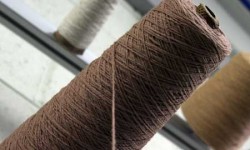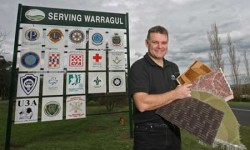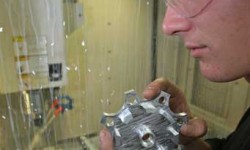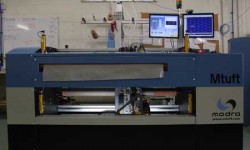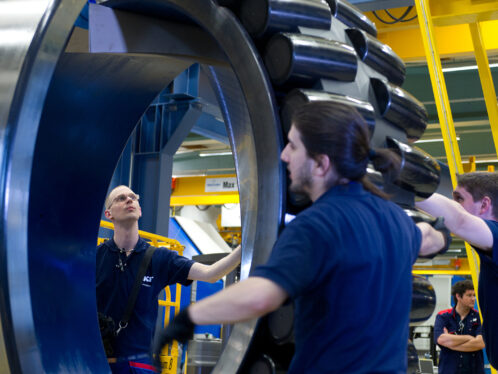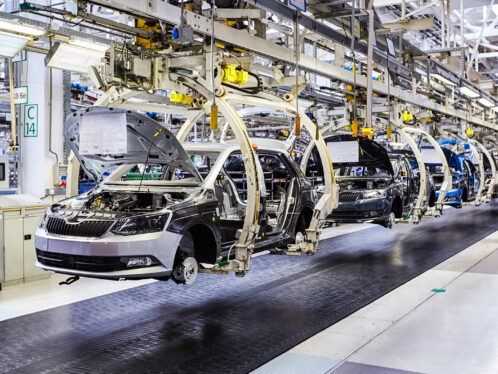
Weaving through a global marketplace
In a regional outpost in southeastern Australia sits a company that has revolutionized carpet sampling around the world.
In a regional outpost in southeastern Australia sits a company that has revolutionized carpet sampling around the world.
The Australian townof Warragul is a regional centre in the state of Victoria, situated 100 kilometres southeast of Melbourne in the heart of Gippsland. The area is known for its rich agricultural lands and its dairy industry. However, at Modra Technology, located in the town itself, the focus is on manmade tufts. Modra Technology is a 16-person company that manufactures sample machines for the global carpet production industry.
Managing Director Tim Modra first came across the carpet manufacturing industry 15 years ago when he was doing some contract engineering work for a manu-facturer in Geelong near Melbourne. An associate noticed that to create a sample of carpet, production had to be stopped, and this was a massive cost in terms of production and labour time. He decided to do something about it.
“Together we built a machine called ‘the Kibby’ for a type of carpet called ‘Axminster,’” he recalls. The Kibby creates carpet samples in sizes up to 45 by 45 centimetres with up to 40 colours, and it features a changeable aluminium pegboard. The included control PC can load industry-standard design formats and common image formats to create photo-reproduction or more classic carpet samples.
With an additional universal sample machine, and Modra’s main seller, the Mtuft, also on the market, Modra has gained success worldwide. “We have found opportunities in a small segment that allow us to go all around the world at once,” says Tim Modra. “Being where we are in Oceania and being English-speaking is an advantage. Australia probably has only 2 percent of the world’s carpet manufacturing industry, so we haven’t got many local opportunities.”
Modra’s sales are50 percent in the United States, 20 percent in Europe, 15 percent in China and 15 percent in the rest of the world. Tim Modra believes that his global market will remain as it is, despite other industries moving en masse to China. “The final product being made is fairly big and bulky, so China right now is less of a threat to the US market because of the shipping cost,” he explains.
Modra also believes that his market will continue to grow. “People always like to walk on soft stuff and have creative things around them in their home, and they’re prepared to pay dollars for it,” he says. He sees his company as a model for others as a niche manufacturer with a worldwide market.”We invest here in CNC machinery, computer technology, so the labour cost in making our machines is comparatively low,” he says. “This helps us to be competitive worldwide.”
For Modra Technology, being the only one of its kind also helps.
“We are unique in the products we manufacture,” says Modra. “If you have a unique product, then people don’t really care where it’s from.”
Initially, to combat geographical borders, Modra set up an international support network. The company continues to sell through various regional agents that work on commission. “When I established overseas, we set up local technical support. In England I had an allegiance with a local electronics company to provide technical support, and that was the major reason we received a number of orders,” he explains. In addition, Modra uses industry standard computer programs in its machines, so the customer already knows how to use key control functions.
With modern daycommunications, however, much of the technical support can be managed from Warragul. “We can upload software updates to machines across the world from here,” he says. “We strive to give really good support, even though we may be on the other side of the world.
Listening to his customer’s needs is a large part of Modra’s job. As managing director, his role is not only to drive sales, but also to lead innovation, a cornerstone of Modra Technology.
The Mtuft machine, for example, was born out of the inadequacy of the Kibby, which only sampled Axminster carpets. The Mtuft has integrated Ned Graphics Vision Tuft Software, which enables people to be creative with sampling without the cost of disrupting production. The machine enables up to eight colours and produces up to a 2-metre-wide sample from a roll rather than a square. It can produce a series of samples in different colours without an operator being present, so it can run overnight.
Modra is currently developing a new machine that is 5 metres wide and has up to eight times the capacity of the Mtuft. It hopes to have the machine on the market by 2008. One dilemma, however, is what to call it.
“The Mtuft has worldwide recognition,” says Modra. “So we are thinking about whether or not to keep that name. M stands for Modra and Tuft is the process of the machine. But my daughter’s name is Kim, and she’s saying ‘Daddy, call it Kim Tuft.’”
Cooperation built on trust
SKF provides traditional linear products to Modra Technology from across its product offering. The relationship has grown in the past five years. Modra Technology and SKF Australia have a true partnership in innovation. SKF Australia Account Manager Chris Marturano and Product Manager David Hofstede were involved with Modra staff in the prototype development of the Mtuft machine and continue to be involved in development.
“There is a fair amount of trust between the two companies,” says Hofstede. “We discuss each project and decide which solution best suits their needs.”
“They’ve got some really great in-house technical people, and they are very hands on, so if they can’t find something they want, they’ll make it themselves,” adds Marturano.
Hofstede says SKF’s broad product offering is a key attraction, as well as quality and price, in addition to its global support base.
Modra Managing Director Tim Modra concurs. “With the products from SKF, we can put in and ignore it; we know it’s OK,” he says. “It will work for the life of the product.”


